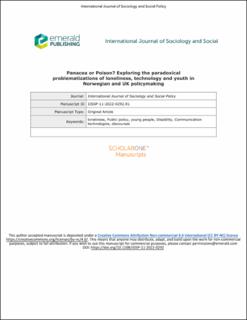Panacea or Poison? Exploring the paradoxical problematizations of loneliness, technology and youth in Norwegian and UK policymaking
Peer reviewed, Journal article
Accepted version
Permanent lenke
https://hdl.handle.net/11250/3063472Utgivelsesdato
2023Metadata
Vis full innførselSamlinger
- Publikasjoner fra Cristin [3269]
- SAM - Institutt for sosialfag [471]
Originalversjon
http://dx.doi.org/10.1108/IJSSP-11-2022-0292Sammendrag
Loneliness’ impact on health and wellbeing has emerged as a public health issue in several countries. Young people are increasingly understood as a ‘risk group’ and intervention target for loneliness-reduction. This research paper presents a discourse analysis of policies and political speech about young people and loneliness. Using discourse analysis inspired by Carol Bacchi's ‘What is the Problem Represented to Be’ (WPR) approach, this cross-cultural analysis studies loneliness policy in the UK and Norway. In doing so, we ask: What is the problem of loneliness among young people represented to be in UK and Norwegian welfare policy? Our findings indicate paradoxical problematizations of the role technology plays among lonely young people, who, in this context, are divided in two categories: ablenormative and disabled youth. We reveal fundamental differences in beliefs about the impact of technology on these groups, and corresponding differences in the proposed solutions. The problem of young peoples’ loneliness is represented as uncertainty about potential harms of digital connectedness and reduced face-to-face interactions. In contrast, the problem of loneliness among disabled youth is represented as impeded access to social realms, with technology serving a benign role as equalizer. Little research has examined this new policy field. Our article contributes to filling this gap and encourages policymakers to consider how political discourses on loneliness may lead them to overlook digital interventions young people could find beneficial.

